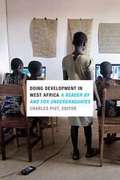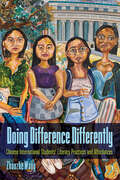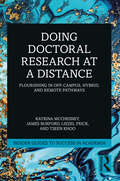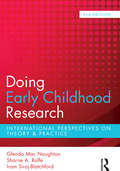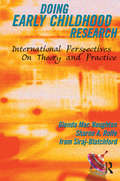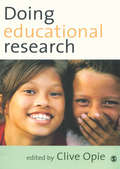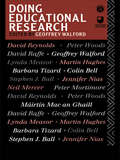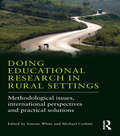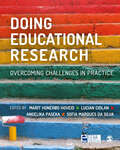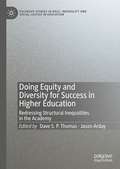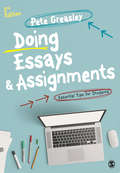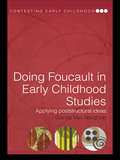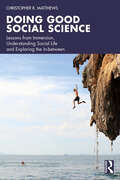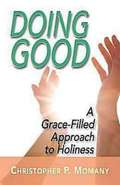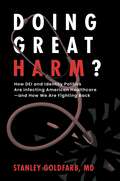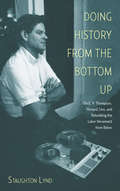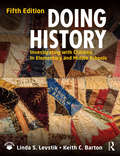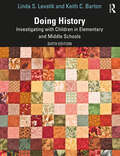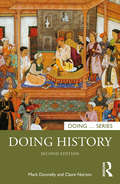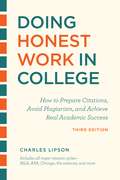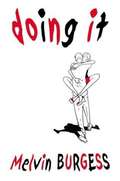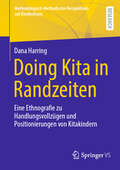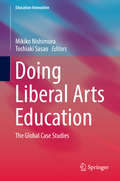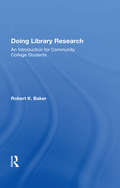- Table View
- List View
Doing Development in West Africa: A Reader by and for Undergraduates
by Charles PiotIn recent years the popularity of service learning and study abroad programs that bring students to the global South has soared, thanks to this generation of college students' desire to make a positive difference in the world. This collection contains essays by undergraduates who recount their experiences in Togo working on projects that established health insurance at a local clinic, built a cyber café, created a microlending program for teens, and started a local writers group. The essays show students putting their optimism to work while learning that paying attention to local knowledge can make all the difference in a project's success. Students also conducted research on global health topics by examining the complex relationships between traditional healing practices and biomedicine. Charles Piot's introduction contextualizes student-initiated development within the history of development work in West Africa since 1960, while his epilogue provides an update on the projects, compiles an inventory of best practices, and describes the types of project that are likely to succeed. Doing Development in West Africa provides a relatable and intimate look into the range of challenges, successes, and failures that come with studying abroad in the global South.Contributors. Cheyenne Allenby, Kelly Andrejko, Connor Cotton, Allie Middleton, Caitlin Moyles, Charles Piot, Benjamin Ramsey, Maria Cecilia Romano, Stephanie Rotolo, Emma Smith, Sarah Zimmerman
Doing Difference Differently: Chinese International Students’ Literacy Practices and Affordances
by Zhaozhe WangDoing Difference Differently ethnographically recounts the stories of four Chinese international students navigating the complex socio-academic environment of a North American institution for higher education. Zhaozhe Wang traces the ecologically situated and distributed literacy practices of these individuals across rhetorical contexts, both on and off campus, and reconstructs the digitally networked, spatiotemporally emerging, rhetorically potent, and ecologically afforded literacy worlds of Chinese international students. Doing Difference Differently provides an in-depth, nuanced understanding of the multifaceted literate lives of this often-marginalized cultural group, highlighting their diverse aspirations, personas, communities, challenges, and strategies. The book reconceptualizes the linguistic and cultural differences of Chinese international students as active processes of embracing, performing, resisting, negotiating, and redefining the identities that institutions impose on them through everyday literacy practices. Wang offers an analytical heuristic for researchers and educators to better understand these students’ backgrounds and to more effectively and ethically support and advocate for them. This case study critically engages broad and interconnected concepts that are essential to educators’ collective understanding of Generation Z students brought up in cultural and educational contexts outside of the European-American sphere. This book appeals to scholars, researchers, teachers, and administrators working in North American higher education and English-speaking countries, particularly those in the fields of writing studies, second language studies, applied linguistics, multilingual education, literacy studies, and international education. Educators across disciplines seeking to better understand the growing population of Chinese international students in North America will likewise benefit.
Doing Doctoral Research at a Distance: Flourishing In Off-Campus, Hybrid, and Remote Pathways (Insider Guides to Success in Academia)
by James Burford Tseen Khoo Katrina McChesney Liezel FrickEmerging from personal experience and empirical research, Doing Doctoral Research at a Distance is a key companion text for doctoral students from a range of research fields and geographical contexts who are undertaking off-campus, hybrid, and remote pathways. Offering guidance about the entire off-campus doctoral journey, the book introduces contexts of distance study; key information to get off to a flying start; organising time, space and plans to get work done; juggling employment, family and other commitments alongside distance study; doctoral identity and wellbeing; working with doctoral supervisors at a distance; accessing research culture at a distance; and managing the bumps along the road of the distance doctorate. Written for doctoral researchers, this book offers strategies to help those working at a distance to flourish. This book is ideally suited for those contemplating distance study, distance doctoral students who are starting their off-campus journey, and supervisors and others who are working with distance doctoral researchers.‘Insider Guides to Success in Academia’ offers support and practical advice to doctoral students and early-career researchers. Covering the topics that really matter, but which often get overlooked, this indispensable series provides practical and realistic guidance to address many of the needs and challenges of trying to operate, and remain, in academia. These neat pocket guides fill specific and significant gaps in current literature. Each book offers insider perspectives on the often implicit rules of the game – the things you need to know but usually aren’t told by institutional postgraduate support, researcher development units, or supervisors – and will address a practical topic that is key to career progression. They are essential reading for doctoral students, earlycareer researchers, supervisors, mentors, or anyone looking to launch or maintain their career in academia.
Doing Early Childhood Research: International perspectives on theory and practice
by Glenda Mac NaughtonDoing Early Childhood Research demystifies the research process. An international team of experienced researchers shows how to select methods which are appropriate for working with young children in early childhood settings or at home.They provide a thorough introduction to the most common research methods used in the early childhood context. Reflecting the multidisciplinary nature of much early childhood research, they cover a wide range of conventional and newer methods including observation, small surveys, interviews with adults and children, action research, ethnography and quasi-experimental approaches. They explain clearly how to set up research projects which are theoretically grounded, well-designed, rigorously analysed, feasible and ethically based. Each chapter is illustrated with examples.Widely used by early childhood researchers in many countries, this second edition of Doing Early Childhood Research has been fully revised. It includes new chapters on beginning research, mixed methods research, interviewing children, and working with Indigenous children, and also new case study chapters. It is essential reading for novice, initial career and experienced researchers.'It is rare for any research methodology book to cover so much ground, and contain so many different kinds of resources between two covers.' - Journal of Education for Teaching 'As a guide for new and inexperienced researchers, it is second to none.' - British Journal of Educational Studies
Doing Early Childhood Research: International perspectives on theory and practice
by Glenda Mac Naughton; Sharne A. Rolfe; Iram Siraj-BlatchfordDoing Early Childhood Research demystifies the research process. An international team of experienced researchers shows how to select the right questions and use the appropriate methods to investigate important issues in early childhood.The editors and authors provide a thorough introduction to the most common research methods used in the early childhood context. Reflecting the multidisciplinary nature of much early childhood research, they cover a wide range of conventional and newer approaches including observation, small surveys, action research, ethnography, policy analysis and poststructuralist approaches. They explain clearly how to set up research projects which are theoretically grounded, well-designed, rigorously analysed, feasible and ethically fair. Each chapter is illustrated with examples and case studies.Doing Early Childhood Research is essential reading for new researchers and students inexperienced in conducting research.
Doing Educational Research
by Clive Opie`A welcome and helpful addition to the shelves of tutors and students working on masters programmes. It will be most beneficial supporting students on programmes where there is a substantial research training component. It offers important exemplars of using computer software in qualitative analysis′ - Educational Review `This book is aimed at Master′s students who are engaging in educational research for the first time. [It] provides teacher-researchers with the additional information they need so they can go on to read further and more in depth, having more confidence in the accessibility of such studies. I found it does this well, and is an ideal point of reference for those who are just embarking on a Master′s degree. A useful glossary is provided, giving detailed but ′readable′ explanations of key terms and phrases′ - Primary Practice Doing Educational Research offers a hands-on guide for students engaged in educational research. It provides a comprehensive and accessible introduction to the key qualitative and quantitative methods necessary for those commencing research for the first time. Through a detailed yet concise explanation, the reader is shown how these methods work and how their outcomes may be interpreted. Providing all the essentials for the first-time researcher, the book includes: · a variety of examples and case studies to illustrate how the methods and techniques can be used in `real-life′ contexts · practical guidance on time management planning research projects and writing reports. · a broad coverage - including qualitative and quantitative methodologies, data analysis using computer software, ethical issues and the writing-up and presentation of data. This engaging book has been written by a team of leading researchers with over sixty years of cumulative experience. It has a student-friendly structure which will make it accessible and popular with undergraduates and postgraduates. It will be an invaluable resource for both students and researchers, helping them to undertake effective research in education.
Doing Educational Research
by Geoffrey WalfordThirteen major educationalists offer semi-autobiographical accounts of their own influential research work, focusing on the practical and personal realities of the research process. Authors such as Barbara Tizard and Martin Hughes, Stephen J. Ball, David Reynolds and Peter Mortimore discuss their approaches to aspects of research from conception and funding of the project to information gathering and analysis, writing up and publishing.
Doing Educational Research in Rural Settings: Methodological issues, international perspectives and practical solutions
by Michael Corbett Simone WhiteDoing Educational Research in Rural Settings is a much-needed guide for educational researchers whose research interests are located outside metropolitan areas in places that are generically considered to be rural. This book is both timely and important as it takes up the key question of how to conduct educational research within and for rural communities. It explores the impact of educational research in such contexts in terms of the lasting good of research and also those being researched. The authorship is international, which brings together researchers experienced in conducting educational inquiry in rural places from across European, Australian, American, and Canadian contexts, allowing readers insight into national and regional challenges. It also draws on the research experiences and methodological challenges faced by senior figures in the field of rural educational research, as well as those in their early careers. Key topics include: Working with and within the rural; The impact of educational globalisation and the problematisation of cultural difference in social research; Researcher subjectivities; The position of education research in rural contexts; The usefulness of research Reciprocity and converging interest; Ethics and confidentiality. This book is uniquely written with an eye to practicality and applicability, and will be an engaging guide for higher degree and doctoral students seeking to gain a stronger understanding of educational research in rural settings.
Doing Educational Research: Overcoming Challenges In Practice
by Sofia Marques da Silva Professor Marit Honerød Hoveid Professor Lucian Ciolan Professor Angelika PasekaEvery educational research project has challenges and obstacles that need to be managed and overcome. This book uses real case studies employing a wide range of research methodologies and drawn from educational contexts across Europe to explore these challenges offering flexible and universal guidance that you can apply to your own research. Published in partnership with EERA, this book is: · Realistic and informed: It explores a range of perspectives on educational research, from planning to data collection to international collaboration · Challenging: It integrates a holistic and critical view on the process of educational research · Culturally aware: It covers a variety of research projects from different countries and encourages you to challenge dominant perspectives in education This is the first major English language textbook for postgraduate and postdoctoral education researchers that represents and explores the range of research traditions that exist throughout Europe and what they mean in practice.
Doing Educational Research: Overcoming Challenges In Practice
by Sofia Marques da Silva Professor Marit Honerød Hoveid Professor Lucian Ciolan Professor Angelika PasekaEvery educational research project has challenges and obstacles that need to be managed and overcome. This book uses real case studies employing a wide range of research methodologies and drawn from educational contexts across Europe to explore these challenges offering flexible and universal guidance that you can apply to your own research. Published in partnership with EERA, this book is: · Realistic and informed: It explores a range of perspectives on educational research, from planning to data collection to international collaboration · Challenging: It integrates a holistic and critical view on the process of educational research · Culturally aware: It covers a variety of research projects from different countries and encourages you to challenge dominant perspectives in education This is the first major English language textbook for postgraduate and postdoctoral education researchers that represents and explores the range of research traditions that exist throughout Europe and what they mean in practice.
Doing Equity and Diversity for Success in Higher Education: Redressing Structural Inequalities in the Academy (Palgrave Studies in Race, Inequality and Social Justice in Education)
by Jason Arday Dave S. P. ThomasThis book provides a forensic and collective examination of pre-existing understandings of structural inequalities in Higher Education Institutions. Going beyond the current understandings of causal factors that promote inequality, the editors and contributors illuminate the dynamic interplay between historical events and discourse and more sophisticate and racialized acts of violence. In doing so, the book crystallises myriad contemporary manifestations of structural racism in higher education. Amidst an upsurge in racialized violence, civil unrest, and barriers to attainment, progression and success for students and staff of colour, doing equity and diversity for success in higher education has become both politically urgent and morally imperative. This book calls for a redistribution of power across intersectional and racial lines as a means of decentering whiteness and redressing structural inequalities in the academy. It is essential reading for scholars of sociology and education, as well as those interested in equality and social justice.
Doing Essays and Assignments: Essential Tips for Students
by Pete GreasleyHave you ever been stunned by a low grade, when you were expecting an A or B? Are you struggling to make the jump from a second to a first? Doing Essays and Assignments gives you an insider’s view on what tutors and professors really want when they assign essays and projects, and reveals how you can raise your game and achieve the best grades. Drawing on a survey of lecturers, and examples of real student work, this handy guide provides practical advice to help you not only understand what is expected of you, but also get ideas on how to deliver what your tutor is looking for. Providing a behind-the-scenes look at marking, find out how you can successfully craft the perfect written assignment, and discover tips and techniques on: Planning and deadlines, helping you manage your workload effectively Gaining higher marks through critically formed arguments Communicating clearly with the correct language, grammar, and expression Avoiding common marking pitfalls such as referencing and plagiarism. This new edition also reveals how to successfully navigate group work, literature reviews, and presentations to improve your grades. With valuable insight from tutors, and practical tips to apply to your work, you might just want to keep this book to yourself…! SAGE Study Skills are essential study guides for students of all levels. From how to write great essays and succeeding at university, to writing your undergraduate dissertation and doing postgraduate research, SAGE Study Skills help you get the best from your time at university. Visit the SAGE Study Skills hub for tips, resources and videos on study success!
Doing Foucault in Early Childhood Studies: Applying Post-Structural Ideas (Contesting Early Childhood)
by Glenda Mac NaughtonThe theories and analyses of post-structural thinkers such as Michel Foucault can seem a long way from practice in early childhood services. In recent years, however, many early childhood researchers and practitioners have found this work important and this fascinating book brings together a range of research and case-studies showing how teachers and researchers have brought post-structuralism to the classroom. The book covers such issues as: becoming post-structurally reflective about truth mapping classroom meanings tactics of rhizoanalysis becoming again in critically-knowing communities. Case-studies and examples taken from real situations are used and will be of interest to anyone studying or researching early childhood practice and policy.
Doing Good Social Science: Lessons from Immersion, Understanding Social Life and Exploring the In-between
by Christopher R. MatthewsDoing Good Social Science takes readers on a personal and thought-provoking journey and empowers readers to become unshakeable, free-thinking scholars.Drawing from nearly two decades of experience in research and mentorship, this book shares insights gained from creating ‘immersive moments’ to challenge conventional methodology and social theory. In doing so, it integrates ideas from classical and contemporary scholarship across various disciplines, bringing them to life through engaging field notes, interviews, and often humorous examples. The book outlines how to cultivate disciplined and systematic scholarship on complex topics while critiquing the ‘wonky’ practices that often pervade modern academia. Part One advocates for a more scientific approach to social science, offering guiding principles for scholars striving to understand social life. Part Two deepens and complicates these arguments by examining the philosophical foundations of social science, focusing specifically on the ‘in-between’ aspects of the human condition and our social nature. The writing and thinking in the book are distinctive, passionate and brave.This book is a compelling read for advanced students, early career researchers, and any academic seeking to develop a more liberated, inventive approach to methods.
Doing Good: A Grace-Filled Approach to Holiness
by Rev Christopher P. MomanyChristianity in its purest form involves putting God’s love into action. Wesleyans have traditionally understood this embodiment and expression of God’s love as holiness. • Four-session guide helps individuals and small groups understand and embrace the Wesleyan understanding of holiness• Explores the Wesleyan approach to both law and grace• Guides individuals to match faith with action• Provides Christian educators with a tool for teaching an important Wesleyan doctrine• Shows individuals and churches how to express Christianity in ways that attract others to the faith and the life of the church
Doing Great Harm?: How DEI and Identity Politics Are Infecting American Healthcare—and How We Are Fighting Back
by Stanley GoldfarbThe doctor who leads the movement to restore sanity to American medicine explains why we must rid it of identity politics.Wokeness has taken over the medical establishment of the United States—and the future of healthcare hangs in the balance. So does the health of every American. Dr. Stanley Goldfarb, a distinguished nephrologist and medical school dean, was cancelled for questioning the effect that DEI (Diversity, Equity, and Inclusion) was having on medical schools and the wider world of medicine. But Dr. Goldfarb didn&’t stay cancelled. He founded Do No Harm, the nation&’s leading organization in the fight to protect healthcare from the disastrous consequences of identity politics. Dr. Goldfarb refused to accept the repurposing of medical schools as places to produce gun control and climate change activists rather than doctors whose job it is to heal the sick. In Doing Great Harm?, he exposes the ways in which identity politics, DEI, and gender radicalism have infected medical schools and the practice of medicine. Besides doing a disservice to the many outstanding physicians of color, identity politics have dismantled standards for admission to medical school, decreased the quality of medical students, increased the number of incompetent doctors throughout the land, and enabled the chemical and surgical mutilation of minors. A radical, divisive, and discriminatory ideology has captured the commanding heights of the medical profession. But Americans don&’t want this in healthcare any more than they do in public safety or education—and neither do most physicians. Dr. Stanley Goldfarb calls woke medicine what it is: dangerous, un-American…and profoundly harmful.
Doing History from the Bottom Up: On E.P. Thompson, Howard Zinn, and Rebuilding the Labor Movement from Below
by Staughton LyndReflections on the crucial importance of including the perspectives of the marginalized and the non-elite in our historical accounts.In the 1960s, historians on both sides of the Atlantic began to challenge the assumptions of their colleagues and push for an understanding of history “from below.” In this collection of writings, Staughton Lynd, one of the pioneers of this approach, laments the passing of fellow luminaries David Montgomery, E.P. Thompson, Alfred Young, and Howard Zinn; offers an account of the decline of trade unionism based on the narratives of workers and his efforts as a lawyer to assist them; and makes the case that contemporary academics and activists alike should take more seriously the stories and perspectives of Native Americans, slaves, rank-and-file workers, and other still-too-frequently marginalized voices.
Doing History: Investigating with Children in Elementary and Middle Schools
by Keith C. Barton Linda S. LevstikNow in its fifth edition, Doing History offers a unique perspective on teaching and learning history in the elementary and middle grades. Through case studies of teachers and students in diverse classrooms and from diverse backgrounds, it shows children engaging in authentic historical investigations, often in the context of an integrated social studies curriculum. The premise is that children can engage in valid forms of historical inquiry--collecting and analyzing data, examining the perspectives of people in the past, considering multiple interpretations, and creating evidence-based historical accounts. Grounded in contemporary sociocultural theory and research, the text features vignettes in each chapter showing communities of teachers and students doing history in environments rich in literature, art, writing, discussion, and debate. The authors explain how the teaching demonstrated in the vignettes reflects basic principles of contemporary learning theory. Doing History emphasizes diversity of perspectives in two ways: readers encounter students from a variety of backgrounds, and students themselves look at history from multiple perspectives. It provides clear guidance in using multiple forms of assessment to evaluate the specifically historical aspects of children's learning.
Doing History: Investigating with Children in Elementary and Middle Schools
by Keith C. Barton Linda S. LevstikNow in its sixth edition, Doing History offers a unique perspective on teaching and learning history in the elementary and middle grades. Through case studies of teachers and students in diverse classrooms and from diverse backgrounds, it shows children engaging in authentic historical investigations, often in the context of an integrated social studies curriculum. The book is grounded in the view that children can engage in valid forms of historical inquiry—asking questions, collecting and analyzing evidence, examining the varied perspectives and experiences of people in the past, and creating evidence-based historical accounts and interpretations. Grounded in contemporary sociocultural theory and research, the text features vignettes in each chapter showing communities of teachers and students doing history in environments rich in literature, art, writing, and discussion. The authors explain how these classrooms reflect contemporary principles of teaching and learning, and thus, the descriptions not only provide specific examples of successful activities but also place them in a context that allows teachers to adapt and apply them in a wide range of settings. Doing History emphasizes diversity in two ways: Readers encounter students from a variety of backgrounds and see how their diverse experiences can form the foundation for learning, and they also see examples of how teachers can engage students with diverse experiences and perspectives in the past, including those that led to conflict and oppression. The book also discusses principles for working with English learners and newcomers, and it provides guidance in using multiple forms of assessment to evaluate the specifically historical aspects of children’s learning. Updates to this edition include updated historical and instructional examples to ensure currency, new suggestions for children’s literature to support good teaching, expanded attention to teaching about oppressed groups in history, and greater attention to when historical perspective taking is and is not appropriate.
Doing History: Leadership Secrets Of History (Doing... Series)
by Mark Donnelly Claire NortonDoing History bridges the gap between the way history is studied in school or as represented in the media and the way it is studied at university level. History as an academic discipline has dramatically changed in recent decades and has been enhanced by ideas from other disciplines, the influence of postmodernism and historians&’ incorporation of their own reflections into their work. Doing History presents the ideas and debates that shape how we &‘do&’ history today, covering arguments about the nature of historical knowledge and the function of historical writing, whether we can ever really know what happened in the past, what sources historians depend on, and the relative value of popular and academic histories. This revised edition includes new chapters on public history and activist histories. It looks at global representations of the past across the centuries, and provides up-to-date suggestions for further reading, presenting the reader with a thorough and current introduction to studying history at an academic level as well as a pathway to progress this study further. Clearly structured and accessibly written, it is an essential volume for all students embarking on the study of history.
Doing Honest Work in College, Third Edition: How to Prepare Citations, Avoid Plagiarism, and Achieve Real Academic Success (Chicago Guides to Academic Life)
by Charles LipsonDoing Honest Work in College stands on three principles: do the work you say you do, give others credit, and present your research fairly. These are straightforward concepts, but the abundance of questionable online sources and temptation of a quick copy-paste can cause confusion as to what’s considered citing and what’s considered cheating. This guide starts out by clearly defining plagiarism and other forms of academic dishonesty and then gives students the tools they need to avoid those pitfalls. This edition addresses the acceptable use of mobile devices on tests, the proper approach to sources such as podcasts or social media posts, and the limitations of citation management software.
Doing It
by Melvin BurgessI mean-I like girls. I get on well with them. And I like sex. Not that I've had all that much experience of it-not with another person being in the room at the same time, anyway. I just can't somehow put the two together. I can be getting on really well with a girl but as soon as I get an inkling that there might be a chance of anything happening, I just freeze up. It's scary. Everything you never wanted to know about sex and boys-but probably should Dino, Jonathan, and Ben have got some problems, mostly with Jackie, Deborah, and Alison. Dino's girlfriend Jackie, the most beautiful girl in school, drives him mad with lust, but won't go all the way and relieve Dino of his desperately unwanted virginity. Jonathan likes Deborah. She's smart and funny and she makes him feel very sexy, but she's kind of plump and his mates won't let him hear the end of it. Ben's been seduced by Alison, the pretty young drama teacher at school. And what seems like a dream come true is actually making him miserable. Award-winning author Melvin Burgess has written a daringly honest and often hilarious account of contemporary teenage life, and the ups and downs that surround "doing it. "
Doing Kita in Randzeiten: Eine Ethnografie zu Handlungsvollzügen und Positionierungen von Kitakindern (Methodologisch-Methodische Perspektiven auf Kindheit(en))
by Dana HarringIn dieser Studie werden soziale Praktiken rekonstruiert, die der Herstellung, der Aufrechterhaltung und der Beendigung eines Beziehungsgefüges in den Randzeiten institutioneller Kindertagesbetreuung dienen. Dabei werden mit einem ethnografischen Zugang insbesondere die Handlungsvollzüge und Positionierungen von jungen Kindern in Kindertageseinrichtungen in den Blick genommen. Mit einer sozialkonstruktivistisch-praxistheoretischen Perspektive sowie in Bezug auf theoretische Konzepte der Kindheitsforschung wird nachgezeichnet, wie Kinder in Auseinandersetzung mit Räumen, Materialien und pädagogischen Fachkräften Randzeiten als soziale Form herstellen. Weiterhin werden die Selbst- und Fremdpositionierungen von Kindern als Kitakinder, „Doing Kitakind“, in Relation zu generationalen Ordnungsprozessen rekonstruiert. „Doing Kita in Randzeiten“ stellt eine konzeptuelle Weiterentwicklung dar, die insbesondere die relationale Handlungsmacht von Kindern in Kindertageseinrichtungen als machtvolle Insider betont.
Doing Liberal Arts Education: The Global Case Studies (Education Innovation Series)
by Mikiko Nishimura Toshiaki SasaoThis book examines and shares concrete and specific strategies and policies for doing liberal arts education in a wide range of contexts. It deepens readers’ understanding of the processes of adopting interdisciplinary and cross-cultural approaches to the development and teaching of liberal arts courses, integrating diversity and inclusion in policies and practices of liberal arts education, and institutionalizing evidence-based policy making. Moreover, it provides educators and policymakers with practical guidelines on how to incorporate core values of liberal arts education.
Doing Library Research: An Introduction For Community College Students
by Robert K. BakerMany college students remain puzzled by card catalogs, can't find books they need, and fail to use many of the important resources of the library despite tours, explanations, and much assistance from librarians. In this book, a community college librarian provides the direction students need to utilize the resources typically found in a community c
